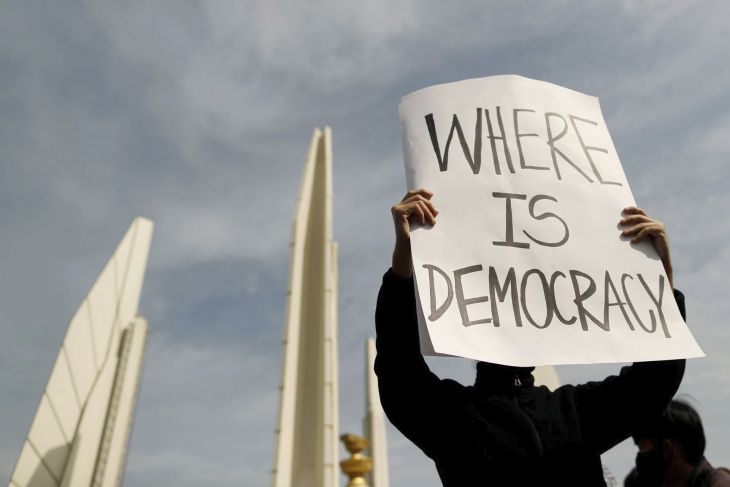This is a question I hear increasingly from friends and colleagues.
Can a government by the people and for the people really be effective in a world that is divided by race, nationality, culture, language, religion, and ideology?
Can democracy survive in an increasingly politicized world where consensus is perceived to be weakness, compromise is capitulation, and opponents are enemies?
Can one have political enemies – as many political leaders are labelling their opponents these days – and not fall prey to the emotional and potentially violent baggage that this language carries?
Can democracy deliver the results that citizens are demanding when it seems that all politicians do is chase their tails?
I am sure that if you stop for a moment and reflect on governance in your country, you will ask where the leadership is and for whom leaders are really working.
You will ask whose interests they represent and how they plan to solve the challenges of poverty, discrimination, inflation, hunger, and all the other problems that plague us.
You may ask what is at the root of our lack of governability.
In my view, there is one overriding answer: human nature.
Human nature has three major elements: power, apathy, and fear.
Regardless of how good their intentions, leaders seek power because, without it, they can do nothing. And as Lord Acton once famously observed – power tends to corrupt, and absolute power corrupts absolutely.
Very few leaders leave office when they should – not because of term limits, electoral defeats, or coups. Simply because their exercise of power was aimed at serving the people and not themselves.
The best example of this phenomenon was Nelson Mandela. He could have held office forever but left without a whiff of scandal or loss of popularity – simply because it was time for him to go.
Most leaders stay on past their sell by date and don’t relinquish power easily. This is true in democracies unless there are safeguards built into the system such as term limits. In some countries, legislators spend 50 years in office and are still around at age 90!
Apathy is another challenge facing democracy.
People prefer not to make the effort to vote for a variety of reasons. Hence, many majority governments are elected by 30% of the population. This means that the will of a majority of the people is not taken into consideration. Can democracies function effectively when this percentage of voters disenfranchise themselves due at least in part to a lack of faith in the system or the belief that their voice doesn’t count?
The third element is fear.
Fear of losing one’s status, assets, identity, culture, or language. Fear of losing the perks that come with a senior social or political position. Fear of the unknown – people who have different values or objectives, people who speak differently or look different, people whose religious beliefs don’t match ours. And fear of appearing to capitulate by seeking consensus and making compromises.
What is the solution?
In an ideal world, I would say a democracy in which dialogue between all parties exists, all sides strive to keep the common good as their political goal, all sides contribute to making the best decisions for society, and all sides express their views in a civil manner.
But for the reasons outlined above, this is not a real possibility given human nature and the impatience of some, the egocentrism of others, and the apathy of many. As well, the innate fear of the other and sense of superiority over others that nationalism and religion breed mitigate against a change human nature that peaceful coexistence demands.
Perhaps an authoritarian system where a strong leader wields power in an effective and humane way, and citizens give up some of their freedoms in order to obtain the results they seek to their problems is the answer. Indeed, China managed to pull 850 million people out of poverty in forty years. But are people in the West ready to live under the pressures of China’s totalitarian system?
I am at a loss.
But I believe that all of us should be engaged in exploring our own feelings about democracy and identifying potential leaders capable of bringing social peace to our societies and achieving clear and definable results that benefit all.
It’s up to you.
Keep reading: Building Leadership in a Complex World
Edición: Laura Espejo
Brigadas de salud visitarán escuelas primarias públicas para revisar y completar los esquemas a niños
La Jornada Maya
Los hechos se registraron en el fraccionamiento Encinos II
La Jornada Maya
Fueron 48 los siniestros de este tipo registrados entre agosto de 2025 y enero de 2026
La Jornada Maya
